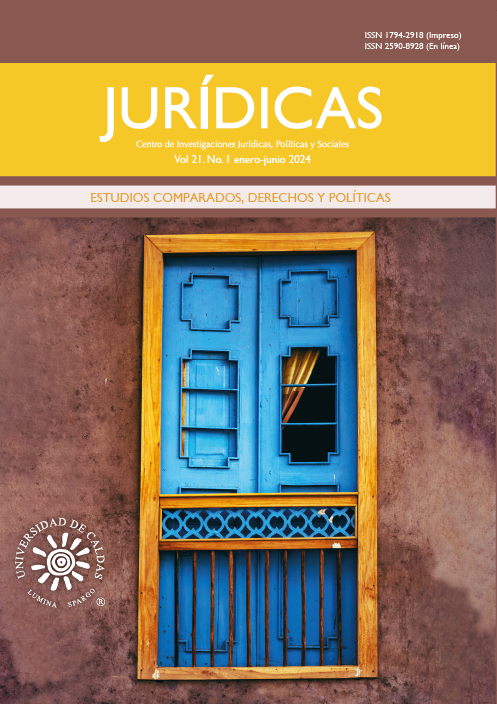Autores
Resumo
El presente estudio se propuso, principalmente, revelar el horizonte de la maternidad subrogada en Latinoamérica alrededor de tres ejes: la investigación, la educación jurídica y la práctica del derecho. La hipótesis principal encontrada fue la necesidad y admisibilidad del acceso de personas homosexuales y parejas del mismo sexo a la maternidad subrogada, desde la investigación, la academia y la profesión jurídica en Latinoamérica. La investigación tuvo un enfoque cuantitativo. El método empleado fue descriptivo. El instrumento utilizado fue una encuesta aplicada a 180 participantes de distintos países de Iberoamérica, seleccionados mediante la técnica de bola de nieve. Se hizo evidente el profundo vacío jurídico en Latinoamérica en relación con la maternidad subrogada; vacío que debe llenarse cuanto antes, realizando, desde la investigación, análisis más pertinentes, generando, a nivel de la educación, un impacto mayor, y llevando a cabo esfuerzos regulatorios, que solo pueden hacerse desde el derecho. El presente artículo constituye, sin duda, un insumo importante para la estructuración de nuevas propuestas de lege ferenda, la formulación de futuras reformas legislativas y la inclusión de la maternidad subrogada en los planes o programas de salud públicos en los países de la región latinoamericana, pero, sobre todo, para la reflexión académica, ya que es un tema aún por conocer.
Referências
Carone, N., Baiocco, R., & Lingiardi, V. (2017). Single fathers by choice using surrogacy: why men decide to have a child as a single parent. Human reproduction, 32(9), 1871-1879. https://doi.org/10.1093/humrep/dex245
Congreso de la República. Proyecto 334 de 2023 (1 de febrero de 2023). G n.° 19 de 2023. [P. Jorge Alejandro Ocampo Giraldo]. https://www.camara.gov.co/maternidad-subrogada-1
Congreso de la República. Proyecto 345 de 2023 (24 de febrero de 2023). G n.° 93 de 2023. [P.Ministro de Justicia y del Derecho; Ministra de Salud y Protección Social]. https://www.camara.gov.co/subrogacion-uterina
Corte Constitucional. (1 de agosto de 2022). Sentencia T-275 de 2022. [MP. Cristina Pardo Schlesinger]. https://www.corteconstitucional.gov.co/relatoria/2022/T-275-22.htm
Corte Constitucional. (18 de abril de 2024). Sentencia T-127 de 2024. [MP. Jorge Enrique Ibáñez Najar]. https://www.corteconstitucional.gov.co/Relatoria/2024/T-127-24.htm
Corte Constitucional. (18 de junio de 2024). Sentencia T-232 de 2024. [MP. Natalia Ángel Cabo]. https:// www.corteconstitucional.gov.co/relatoria/2024/T-232-24.htm
Cheney, K. E. (2022). Discordant Expectations of Global Intimacy: Desire and Inequality in Commercial Surrogacy. Sociological Research Online, 27(1), 43-59. https://journals.sagepub.com/doi/abs/10.1177/1360780420984169
Courtis, C. (2006). El juego de los juristas. Ensayo de caracterización de la investigación dogmática. En C. Courtis (ed.), Observar la Ley. Ensayos sobre la metodología de la investigación dogmática (pp.105-156). Trotta.
Del Savio, L., & Cavaliere, G. (2016). The problem with commercial surrogacy. A reflection on reproduction, markets and labour. BioLaw Journal – Rivista di BioDiritto, (2), 73-91. https://teseo.unitn.it/biolaw/article/view/922
Feldman, E. A. (2018). Baby M Turns 30: The Law and Policy of Surrogate Motherhood. American Journal of Law & Medicine, 44(1), 7-22. https://doi.org/10.1177/0098858818763811
Fenton-Glynn, C., & Scherpe, J. M. (2019). Surrogacy in a Globalised World. Comparative Analysis and Thoughts on Regulation. In J. M. Scherpe, C. Fenton-Glynn & T. Kaan (eds.), Eastern and Western Perspectives on Surrogacy (pp. 515-592). Intersentia.
Jackson, E., Millbank, J., Karpin, I., & Stuhmcke, A. (2017). Learning from Cross-Border Reproduction. Medical Law Rreview, 25(1), 23-46. https://doi.org/10.1093/medlaw/fww045
Joseph, R. A., Rafanello, A. M., Morris, C. J., & Fleming, K. F. (2018). Surrogacy: Pathway to Parenthood. Neonatal Network, 37(1), 19-23. https://doi.org/10.1891/0730-0832.37.1.19
Kawwass, J. F., Penzias, A. S., & Adashi, E. Y. (2021). Fertility-a human right worthy of mandated insurance coverage: the evolution, limitations, and future of access to care. Fertility and sterility, 115(1), 29-42.https://doi.org/10.1016/j.fertnstert.2020.09.155
Lindheim, S. R., Madeira, J. L., Ludwin, A., Kemner, E., Preston Parry, J., Sylvestre, G., & Pennings, G. (2019). Societal pressures and procreative preferences for gay fathers successfully pursuing parenthood through IVF and gestational carriers. Reproductive Biomedicine & Society Online, 9, 1-10. https://pubmed.ncbi.nlm.nih.gov/31934649/
Martínez Muñoz, K. X. y Rodríguez Yong, C. A. (2021). La maternidad subrogada: tendencias de regulación en Latinoamérica. Jurídicas, 18(1), 74-90. https://doi.org/10.17151/jurid.2021.18.1.5
Molina-Ricaurte, C. J. (2021). Maternidad subrogada y parejas del mismo sexo: en intersección. En R. Grana (coord.), Discursos, mujeres y artes. ¿Construyendo o derribando fronteras? (pp. 2535-2555). Dykinson S. L. https://dialnet.unirioja.es/servlet/articulo?codigo=8353797
Piersanti, V., Consalvo, F., Signore, F., Del Rio, A., & Zaami, S. (2021). Surrogacy and “Procreative Tourism”. What Does the Future Hold from the Ethical and Legal Perspectives?. Medicina (Kaunas, Lithuania), 57(1), 47. https://doi.org/10.3390/medicina57010047
Pralat, R. (2021). Sexual identities and reproductive orientations: Coming out as wanting (or not wanting) to have children. Sexualities, 24 (1-2), 276-294. https://doi.org/10.1177/1363460720926967 Salama, M., Isachenko, V., Isachenko, E., Rahimi, G., Mallmann, P., Westphal, L. M., Inhorn, M. C., &
Patrizio, P. (2018). Cross border reproductive care (CBRC): a growing global phenomenon with multidimensional implications (a systematic and critical review). Journal of Assisted Reproduction and Genetics, 35, 1277-1288. https://doi.org/10.1007/s10815-018-1181-x
Russell, C. (2018). Rights-holders or refugees? Do gay men need reproductive justice?. Reproductive Biomedicine & Society Online, 7, 131-140.https://pubmed.ncbi.nlm.nih.gov/31061902/Shalev, C., Moreno, A., Eyal, H., Leibel, M., Schuz, R., & Eldar-Geva, T. (2016). Ethics and regulation of inter-country medically assisted reproduction: a call for action. Israel Journal of Health Policy Research, 5, 1-12. https://doi.org/10.1186/s13584-016-0117-0
Smietana, M. (2019). Procreative consciousness in a global market: gay men’s paths to surrogacy in the USA. Reproductive Biomedicine & Society Online, 7, 101-111. https://www.sciencedirect.com/science/article/pii/S2405661819300048
Torres, G., Shapiro, A., & Mackey, T. K. (2019). A review of surrogate motherhood regulation in south American countries: pointing to a need for an international legal framework. BMC Pregnancy and Childbirth, 19, 46. https://doi.org/10.1186/s12884-019-2182-1
Trimmings, K., & Beaumont, P. (2016). Parentage and surrogacy in a European perspective. In J. M. Scherpe (ed.), European Family Law (volume III, pp. 232-283). Edward Elgar Publishing. https://doi.org/10.4337/9781785363054
UK, Parliament. (16th July 1985). Surrogacy Arrangements Act 1985. https://acortar.link/6HJfQD

 PDF (Español)
PDF (Español)
 FLIP
FLIP
























